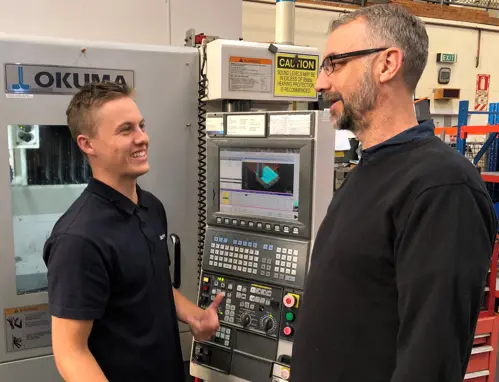Facteon People: Patty Walsh – Trades Assistant to Tradesman
A Facteon Apprenticeship covers almost every aspect of the business. From the manufacture of custom components in the Machine Shop through to the building and commissioning of large-scale production lines with the Build Shop team, our apprentices do it all. They also work closely with Facteon design, control systems and automation engineers to better understand our full-service offering.

Pictured left to right: Facteon Tradesman, Patty Walsh, reflects on his apprenticeship
journey with Manufacturing Manager, Phil Webb.
Trades Assistant to Apprentice to Tradesman. How did you do it?
I had just finished high school and I wasn’t sure what I wanted to do career-wise. My neighbour who is Facteon's Manufacturing Manager, Phil, mentioned that there was a job going at his work as a Trades Assistant. I didn’t know a lot about engineering at the time, but I’d always enjoyed working with my hands so decided to apply. As a Trades Assistant, I learned the basics of engineering. This minimised the uncertainty going into my apprenticeship as I knew what I was signing up for and I was able to hit the ground running.
Studying alongside full time work was great as I wasn’t sitting in a lecture hall or reading textbooks in the library. I learn best through doing so the practical element of an apprenticeship meant I could pick up new skills quite quickly. I was exposed to a range of areas from CAM programming through to control systems and project management. Having moved through different business units, I was sure that I wanted to work in the Machine Shop after I finished my apprenticeship.
Machine Shop versus Build Shop, how did you choose?
The Build Shop is often a popular choice for graduate apprentices. I decided to join the Machine Shop since I enjoy working on a wide range of projects. The Build Shop tends to handle large projects, often spanning many months. As the Machine Shop is focused on delivering components on a short deadline, we tend to turn around work very quickly. In a day, I could be machining a component for the medical industry and later, working on a part for a Facteon production line.
What was the greatest challenge you faced during your apprenticeship?
Aside from balancing working full time and studying, the biggest challenge was taking the theory and applying it to a range of situations. This was particularly difficult in the early stages of my apprenticeship. I found that it was helpful to work with the other apprentices. There’s a group of us that are a similar age and we get on well. So, the guys and I relied on each other for support as we worked our way through the book work and practical projects.
In some workshops, you’d keep the apprentices on the low risk, more basic jobs. But here, I was asked to work on some complex parts. At first, I felt a bit out of my depth, but I learned so much through challenging myself. Of course, I was under the watchful eye of a senior tradesman. They all have such different ways of approaching the same job, so I was taught not only how to machine but how to think. I hope that one day I’ll be at their level. It’s incredible what those guys can do.
What motivates you to come into work each day?
Money isn’t a big motivator for me. I’m far more motivated by having a role that really interests me. I’m lucky to have found my passion relatively early in life. With the variety of jobs coming through the door, there’s always something new to learn. Some of the guys here are expert manual millers, CNC machinists and manual lathe specialists but they never rest on their laurels. They’re always refining their craft. That could be through a casual conversation with another machinist or attending a training course.
Is there anyone who’s been a mentor to you in the business?
Personally, I’m not a believer in having one mentor, but having many. I think that it’s a mistake to focus on learning as much as possible from just one person. Instead, I like to take the best parts of everyone I work with. I’ve found that I’ve learned a lot from people across the business.
Now that you’ve finished your apprenticeship, what’s next?
I’m planning to take a break. I’m travelling across Europe for the next two months with my girlfriend. One of the Facteon apprentices I trained with is in Santorini at the same time so we’re going to meet up with him. I’m looking forward to seeing Rome and catching up with family in the UK as well.
What would you say to the next Facteon Apprentice?
I’d say: “Come and see me if you need help”. The Facteon Workshop is very advanced. We have a range of unique machinery so it can be daunting coming into that environment. We also complete extra training as part of our apprenticeship to broaden our knowledge base. That can make it quite difficult. So, if you need help, just ask.
From the Author: About a Facteon Apprenticeship
A Facteon Apprenticeship is a four-year programme that teaches a range of skills. When our apprentices aren’t learning new skills in the Machine Shop and Build Shop, they’re working with our design, automation and control systems teams to understand every area of the business.
An apprentice will work closely with senior machinists. This provides exposure to a wide range of projects. We aim to teach our apprentices how to solve problems. This is a skill that is essential in any workshop environment so a Facteon apprentice is equipped for life.
Competenz supports Facteon by supplying training materials so our apprentices can gain theoretical knowledge required to contribute to every Facteon project.
Our Apprenticeship Programme goes far beyond the minimum requirements to ensure every tradesman can contribute to delivering quality components on time and to specification.
